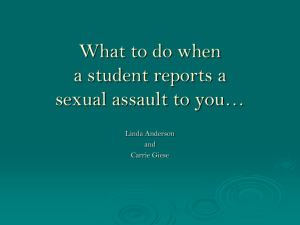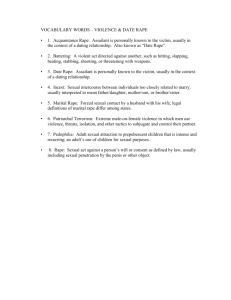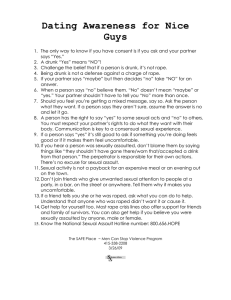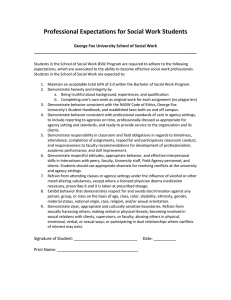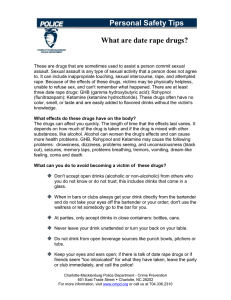OFFICE OF THE UNITED NATIONS HIGH COMMISSIONER FOR HUMAN RIGHTS
advertisement
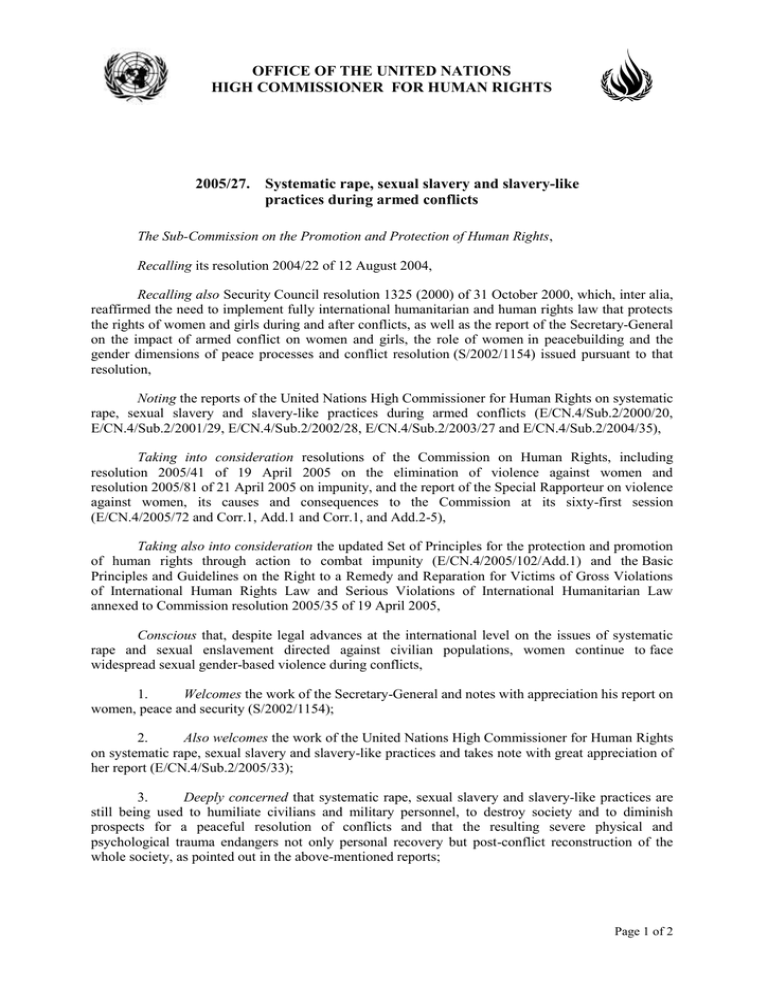
OFFICE OF THE UNITED NATIONS HIGH COMMISSIONER FOR HUMAN RIGHTS 2005/27. Systematic rape, sexual slavery and slavery-like practices during armed conflicts The Sub-Commission on the Promotion and Protection of Human Rights, Recalling its resolution 2004/22 of 12 August 2004, Recalling also Security Council resolution 1325 (2000) of 31 October 2000, which, inter alia, reaffirmed the need to implement fully international humanitarian and human rights law that protects the rights of women and girls during and after conflicts, as well as the report of the Secretary-General on the impact of armed conflict on women and girls, the role of women in peacebuilding and the gender dimensions of peace processes and conflict resolution (S/2002/1154) issued pursuant to that resolution, Noting the reports of the United Nations High Commissioner for Human Rights on systematic rape, sexual slavery and slavery-like practices during armed conflicts (E/CN.4/Sub.2/2000/20, E/CN.4/Sub.2/2001/29, E/CN.4/Sub.2/2002/28, E/CN.4/Sub.2/2003/27 and E/CN.4/Sub.2/2004/35), Taking into consideration resolutions of the Commission on Human Rights, including resolution 2005/41 of 19 April 2005 on the elimination of violence against women and resolution 2005/81 of 21 April 2005 on impunity, and the report of the Special Rapporteur on violence against women, its causes and consequences to the Commission at its sixty-first session (E/CN.4/2005/72 and Corr.1, Add.1 and Corr.1, and Add.2-5), Taking also into consideration the updated Set of Principles for the protection and promotion of human rights through action to combat impunity (E/CN.4/2005/102/Add.1) and the Basic Principles and Guidelines on the Right to a Remedy and Reparation for Victims of Gross Violations of International Human Rights Law and Serious Violations of International Humanitarian Law annexed to Commission resolution 2005/35 of 19 April 2005, Conscious that, despite legal advances at the international level on the issues of systematic rape and sexual enslavement directed against civilian populations, women continue to face widespread sexual gender-based violence during conflicts, 1. Welcomes the work of the Secretary-General and notes with appreciation his report on women, peace and security (S/2002/1154); 2. Also welcomes the work of the United Nations High Commissioner for Human Rights on systematic rape, sexual slavery and slavery-like practices and takes note with great appreciation of her report (E/CN.4/Sub.2/2005/33); 3. Deeply concerned that systematic rape, sexual slavery and slavery-like practices are still being used to humiliate civilians and military personnel, to destroy society and to diminish prospects for a peaceful resolution of conflicts and that the resulting severe physical and psychological trauma endangers not only personal recovery but post-conflict reconstruction of the whole society, as pointed out in the above-mentioned reports; Page 1 of 2 4. Considers that the verdicts of the International Criminal Tribunal for the Former Yugoslavia, the International Tribunal for Rwanda and the Special Court for Sierra Leone acknowledging that rape and, more recently, sexual enslavement are crimes against humanity, and the special recognition in the Rome Statute of the International Criminal Court that sexual violence and sexual slavery committed in the context of either an internal or an international armed conflict may constitute crimes against humanity, war crimes and genocide falling within the jurisdiction of the Court, represent a significant step in the protection of women’s human rights as they challenge widespread acceptance that torture, rape and violence against women are an integral part of war and conflict and hold the perpetrators of such crimes accountable; 5. Reiterates that States should provide effective criminal penalties and compensation for unremedied violations in order to end the cycle of impunity with regard to sexual violence committed during armed conflicts; 6. Encourages States to promote human rights education on the issues of systematic rape, sexual slavery and slavery-like practices during armed conflicts, ensuring the accuracy of accounts of historical events in the educational curricula, in an effort to prevent the recurrence of such violations and to encourage better understanding among all peoples; 7. Calls upon the High Commissioner for Human Rights to submit an updated report to the Sub-Commission at its fifty-eighth session on the issues of systematic rape, sexual slavery and slavery-like practices during armed conflicts; 8. Decides to consider the issue at its fifty-eighth session under the same agenda item. 20th meeting 11 August 2005 [Adopted without a vote. See E/CN.4/2006/2, E/CN.4/Sub.2/2005/44, chap. VIII.] Page 2 of 2
